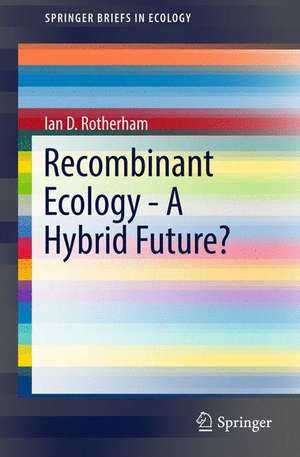Recombinant Ecology - A Hybrid Future?: SpringerBriefs in Ecology
Autor Ian D. Rotherhamen Limba Engleză Paperback – 25 ian 2017
Preț: 399.46 lei
Nou
Puncte Express: 599
Preț estimativ în valută:
76.43€ • 79.80$ • 63.26£
76.43€ • 79.80$ • 63.26£
Carte tipărită la comandă
Livrare economică 01-07 aprilie
Preluare comenzi: 021 569.72.76
Specificații
ISBN-13: 9783319497969
ISBN-10: 3319497960
Pagini: 85
Ilustrații: XIX, 85 p. 16 illus., 8 illus. in color.
Dimensiuni: 155 x 235 mm
Greutate: 0.38 kg
Ediția:1st ed. 2017
Editura: Springer International Publishing
Colecția Springer
Seria SpringerBriefs in Ecology
Locul publicării:Cham, Switzerland
ISBN-10: 3319497960
Pagini: 85
Ilustrații: XIX, 85 p. 16 illus., 8 illus. in color.
Dimensiuni: 155 x 235 mm
Greutate: 0.38 kg
Ediția:1st ed. 2017
Editura: Springer International Publishing
Colecția Springer
Seria SpringerBriefs in Ecology
Locul publicării:Cham, Switzerland
Cuprins
1. An introduction to the concept of recombinant ecology.- 2. An historical perspective of ecological hybridisation.- 3. The impacts of urbanisation.- 4. The impacts of globalisation & cultural severance.- 5. Climate change & ecological hybridisation.- 6. Future nature & the consequences of recombination.
Textul de pe ultima copertă
This book addresses critical issues of changing ecology and ecosystems consequent on urbanisation, globalisation, climate change, and human cultural influences. Human-induced and natural climate changes and globalisation accelerate hybridisation; anthropogenic influences causing disturbance, nutrient enrichment, habitat replacement (formation and destruction), and global dispersal of species. The ecological processes driving changes are ‘natural’ mechanisms of ecological successions and changes, and of species and ecosystem hybridisation or adaptation. Today species mix at rates unprecedented in biodiversity evolution history; with the ‘Anthropocene’, the latest great evolutionary epoch, nature adapts to a new canvas and changed template.
The dramatic and largely unrecognised consequence is hybridisation of both species and ecology. Whilst this process is most easily observed and recognised in increasing urban environments, it occurs more widely, in forestry and agricultural landscapes. With new environmental conditions forged plants, animals and fungi move and mix, beyond natural distributions and limits; old and new, native and exotic, enmeshed in recombinant communities and hybrid ecosystems. Here, and especially in the rapidly expanding urban heartlands of this new ecology, native and alien jostle for position forming novel interactions and dependencies.
This challenging new approach to understanding ecological systems especially in urban and urbanised areas synthesises current ideas. The book develops an historic context to ecological fusion and recombinant or hybrid ecosystems. Invasive and non-native or alien species spread, often aggressively around the globe. Current thinking in ecology and nature conservation fails to accommodate the consequences of changing environmental conditions and fusion of species and ecological communities. Urbanisation and globalisation combine with climate and other changes to trigger new hybrid communities and ecologies. Embedding this approach into current ecological thinking this book presents an overview of ideas set in the exemplar case study area of the British Isles. However, the approaches, ideas and conclusions will find application in ecosystem studies and in nature conservation around the world.
The dramatic and largely unrecognised consequence is hybridisation of both species and ecology. Whilst this process is most easily observed and recognised in increasing urban environments, it occurs more widely, in forestry and agricultural landscapes. With new environmental conditions forged plants, animals and fungi move and mix, beyond natural distributions and limits; old and new, native and exotic, enmeshed in recombinant communities and hybrid ecosystems. Here, and especially in the rapidly expanding urban heartlands of this new ecology, native and alien jostle for position forming novel interactions and dependencies.
This challenging new approach to understanding ecological systems especially in urban and urbanised areas synthesises current ideas. The book develops an historic context to ecological fusion and recombinant or hybrid ecosystems. Invasive and non-native or alien species spread, often aggressively around the globe. Current thinking in ecology and nature conservation fails to accommodate the consequences of changing environmental conditions and fusion of species and ecological communities. Urbanisation and globalisation combine with climate and other changes to trigger new hybrid communities and ecologies. Embedding this approach into current ecological thinking this book presents an overview of ideas set in the exemplar case study area of the British Isles. However, the approaches, ideas and conclusions will find application in ecosystem studies and in nature conservation around the world.
Caracteristici
Unique synthesis of ideas on recombinant and hybrid ecologies and communities Case studies and examples of ecological fusion and processes Predictive models of future ecologies with nature conservation applications Includes supplementary material: sn.pub/extras











